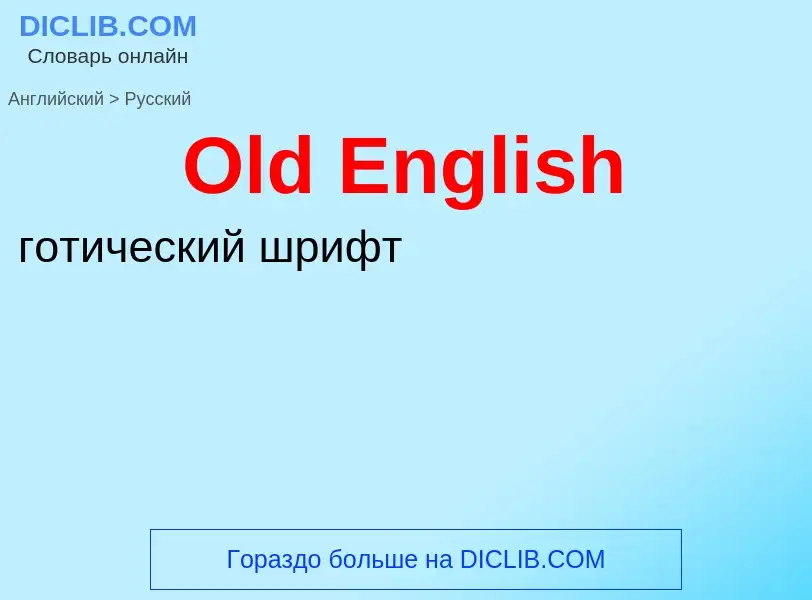Перевод и анализ слов искусственным интеллектом ChatGPT
На этой странице Вы можете получить подробный анализ слова или словосочетания, произведенный с помощью лучшей на сегодняшний день технологии искусственного интеллекта:
- как употребляется слово
- частота употребления
- используется оно чаще в устной или письменной речи
- варианты перевода слова
- примеры употребления (несколько фраз с переводом)
- этимология
Old English - перевод на русский
[,əuld'ɪŋglɪʃ]
общая лексика
древнеанглийский язык (5-11 вв.)
древнеанглийский (язык)
Определение
Википедия
Old English (Englisċ, pronounced [ˈæŋɡliʃ]), or Anglo-Saxon, is the earliest recorded form of the English language, spoken in England and southern and eastern Scotland in the early Middle Ages. It developed from the languages brought to Great Britain by Anglo-Saxon settlers in the mid-5th century, and the first Old English literary works date from the mid-7th century. After the Norman conquest of 1066, English was replaced, for a time, by Anglo-Norman (a relative of French) as the language of the upper classes. This is regarded as marking the end of the Old English era, since during this period the English language was heavily influenced by Anglo-Norman, developing into a phase known now as Middle English in England and Early Scots in Scotland.
Old English developed from a set of Anglo-Frisian or Ingvaeonic dialects originally spoken by Germanic tribes traditionally known as the Angles, Saxons and Jutes. As the Germanic settlers became dominant in England, their language replaced the languages of Roman Britain: Common Brittonic, a Celtic language; and Latin, brought to Britain by the Roman invasion. Old English had four main dialects, associated with particular Anglo-Saxon kingdoms: Mercian, Northumbrian, Kentish and West Saxon. It was West Saxon that formed the basis for the literary standard of the later Old English period, although the dominant forms of Middle and Modern English would develop mainly from Mercian, and Scots from Northumbrian. The speech of eastern and northern parts of England was subject to strong Old Norse influence due to Scandinavian rule and settlement beginning in the 9th century.
Old English is one of the West Germanic languages, and its closest relatives are Old Frisian and Old Saxon. Like other old Germanic languages, it is very different from Modern English and Modern Scots, and largely incomprehensible for Modern English or Modern Scots speakers without study. Within Old English grammar nouns, adjectives, pronouns and verbs have many inflectional endings and forms, and word order is much freer. The oldest Old English inscriptions were written using a runic system, but from about the 8th century this was replaced by a version of the Latin alphabet.



![St Mary's parish church, Breamore]], Hampshire St Mary's parish church, Breamore]], Hampshire](https://commons.wikimedia.org/wiki/Special:FilePath/Her swutelað seo gecwydrædnes ðe.jpg?width=200)

![[[Alfred the Great]] statue in [[Winchester]], [[Hampshire]]. The 9th-century English King proposed that primary education be taught in English, with those wishing to advance to holy orders to continue their studies in Latin. [[Alfred the Great]] statue in [[Winchester]], [[Hampshire]]. The 9th-century English King proposed that primary education be taught in English, with those wishing to advance to holy orders to continue their studies in Latin.](https://commons.wikimedia.org/wiki/Special:FilePath/Statue d'Alfred le Grand à Winchester.jpg?width=200)
